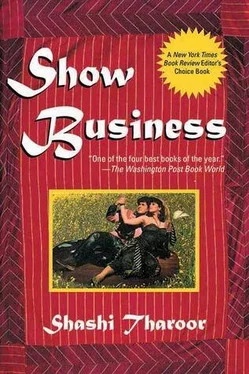To his credit, Sponerwalla doesn’t remind me he’d argued against my foray into the land of the cuckoo clock. “That should be easily remedied,” he says, looking like a chocolate lover who’s just found the soft center. “Let the producers know you’re back in business, and they’ll come flocking to you again.”
But they aren’t. Subramanyam’s face registers even lower levels of disappointment than it did in Delhi: producers aren’t available when he calls them. The one or two offers that are made are at figures I would have turned down five years ago.
“What I am to be telling them, sir? When I told that sir would not be interested at that price, Choubey-sahib saying you tell him anyway, it is more than anyone else will be giving him these days.” He averted his eyes, like a Brahmin before a shish-kebab. “Sorry, sir.”
“Don’t be sorry, Subramanyam, it’s only a phase.” I reassure him with a confidence I never felt in the political world. “These people only know the box office, where they have only heard of up and down, and because of what has happened they think I’m down. What they don’t realize is that I may be down in politics, but as an actor, I’m as good as I ever was, and the people love me.”
“Yes, sir,” says Subramanyam dubiously.
“You don’t seem convinced,” I laugh. “Well, don’t worry. You tell Choubey-sahib I said no to his offer, but that I want to see him. Ask him to come here, let’s say, at teatime tomorrow.”
Fifteen minutes later he is back. “I am not getting Choubey-sahib, sir,” he confesses. “Only his secretary I am getting. He is making me hold on for quite some time, then he is saying, ‘If Ashokji wanting to meet Choubey-sahib, tell him to come here.’ I starting to say something, sir, but then line going dead.”
“Hmm.” I digest this pieces of news; it’s worse than I thought. I suppose the balance sheet of the last few years is none too good: Dil Ek Qila, a few middling hits, the failure of Mechanic. And now a bad name in the press, though for reasons that have nothing to do with my acting. The reek of defeat still clings to my aura. “Well, Subramanyam, perhaps it’s time I paid a visit to Choubey-sahib after all.”
Choubey-sahib lives in a bungalow, of the kind that few producers can afford today: set back from the road, big gate, even a little stretch of grass in front. I am ushered in by a deferential manservant and shown to an overstuffed sofa.
I look around me with interest. It is years since I have been here, years since the producers started coming to me. Continued success has added to Choubey’s prosperity and his furnishings. Sofas, chairs, and a divan are upholstered in red raw silk and generously laden with cushions and bolsters clad in varying hues of the same material. The walls are not spared: I touch one and find it has been papered in raw silk. Yet little of it is visible under a scattering of modern art, all acquired since it became the fashionable thing to buy: a couple of Hu-sains from his mass-production period, an intricate Charan Sharma (mounds of stones seen through a half-open window, the producer’s view of his extras), and a gigantic Anjolie Ela Menon catch my eye. So do the photographs Choubey has placed on every available surface, all depicting the greater glory of Choubey: Choubey with the Prime Minister, Choubey with the dynastic scion who nearly became Prime Minister, Choubey being garlanded by some overdressed woman with a smile as false as her pearls, Choubey with wife and offspring in a studio pose, Choubey with (I am pleased to note) me. Some of these (but not mine) are signed. There are also solitary Choubeys in evidence, from a youthful, chubby-faced Choubey to a more contemporary Choubey, still chubby-faced but no longer youthful, the fat cheeks set in the sullenness of success. Many replica Choubeys, but no original: of the real thing, there is no sign.
“Is Choubey-sahib in?” I ask the manservant.
“Yes, sahib, he is in,” the man confirms. “Sahib, chai, sahib?”
“Coffee, I think,” I demur, just to assert myself. “Have you told Choubey-sahib I am here?”
The man shifts uneasily from foot to foot, his eyes evading mine. “Sahib, I’ll go get the tea,” he says in Hindi, backing away toward the kitchen.
“Not so fast,” I say. “You haven’t answered my question.”
He stands on one leg and cocks his head, as if trying to recall it. “Have you told Choubey-sahib I’m here?” I repeat.
“Sahib, Choubey-sahib is sleeping,” the man informs me sheepishly.
“Well, go and wake him up then,” I demand. “He said eleven o’clock, it’s almost quarter past already.”
“I’ll go get the tea, sahib,” says the servant and disappears before I can catch him again.
I resume, in silence but not tranquillity, my inspection of the Choubey living room. There are three Filmfare statuettes on a sideboard, Best Picture Awards for God knows what, perhaps even something starring me. A brass hookah stands on a corner table, an outsize Nataraj on another. Choubey clearly hasn’t left his interior decor to the kind of people who do the sets of his films. There are wooden elephants, a clay Bankura horse, a bejeweled Rajasthani camel. Glossy coffee table books of photographs by Raghu Rai and Raghubir Singh jostle for space with well-thumbed issues of Showbiz, Stardust, and TV and Video World. Choubey has certainly acquired culture with a vengeance.
The tea arrives, accompanied by thick milky pedas on a plate. “Have you told Choubey-sahib?” I ask ungratefully as the servant sets the tray down.
“Sahib, I — sahib, Choubey-sahib is just coming, sahib.”
I am not mollified. “Did he say that himself?”
“Sahib, Choubey-sahib is sleeping. He has given me strict instructions not to disturb him. But he will wake up soon, I am sure. I am sorry, sahib. I am sure it will not be long, sahib.”
“Well, what time does Choubey-sahib normally wake up?”
The servant shifts uneasily again. “Sir, about this time.”
“About? What time exactly? When did he wake up yesterday?”
“Sahib, yesterday he woke up at noon.”
“And the day before?”
“At noon.”
“So have you ever seen him wake up at eleven and keep an appointment?”
“Yes, sahib, many times.”
“And when was the last time?”
“Sahib, I–I don’t remember.”
So Choubey had called me for an appointment in the morning with every intention of keeping me waiting till he had woken up. That’s the way you treat aspiring actresses and perspiring journalists, not superstars. I feel a deep surge of anger and humiliation well up within me.
I rise.
“Sahib, you haven’t had your tea.”
“Give it to Choubey-sahib,” I say brutally, “with my compliments.”
And I walk out, with as much dignity as I can muster. It is not a lot. After all, I had asked for coffee.
“So what do I do, Tool?”
I am sitting with my erstwhile classmate and current Guru at his new ashram in Worli. I know the compound well: it used to be the old Himalaya Studios. The video revolution, spiraling studio costs, and skyrocketing property prices have changed the economics of the film studios: the owners of the Himalaya got far more from the Guru's expatriate backers than they could have hoped to earn in decades of rentals to film production units. Where once the studio was the fantasyland in which any world could be conjured up with canvas, paint, and a box of nails for next to nothing, filmmakers are finding it cheaper today to hire actual locales. When I began my movie career there must have been thirty film studios in Bombay, and nine-tenths of each film was shot entirely in a studio. Today there are hardly seven or eight, and some of them — like S. T. Studios, in which I shot my first film — are said to be on their last legs. If they could sell, Cyrus tells me, they would; but not all are as lucky, or adept, at getting the necessary bureaucratic permissions as Himalaya. Because of the land-use laws not every studio can sell its property to the highest bidder, so large studio lots, for which a developer would cheerfully pay a fortune, rot underused in prime locations. Rather like me. “You’re sure no one saw you come in?”
Читать дальше












